Hyundai Motor Bundle
How Does Hyundai Motor Company Thrive in the Global Automotive Arena?
Hyundai Motor Company, a powerhouse in the automotive world, has rapidly ascended to become a global leader. Its journey, marked by innovative product launches and strategic market expansions, showcases a compelling story of growth and resilience. Understanding the intricacies of Hyundai operations is key to appreciating its success.
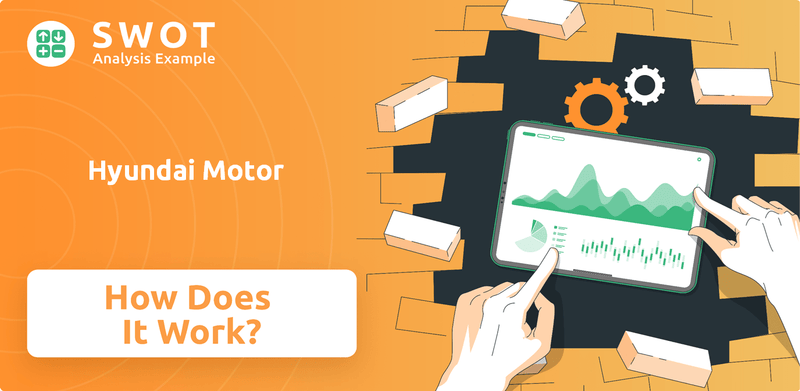
This exploration into the Hyundai Motor SWOT Analysis will provide a deep dive into the company's core operations, revenue streams, and strategic initiatives. We'll examine Hyundai's business model, its commitment to innovation, and its ability to adapt to the ever-evolving demands of the automotive market. From Hyundai manufacturing processes to its global market presence, discover how this automotive giant creates value and sustains its competitive edge.
What Are the Key Operations Driving Hyundai Motor’s Success?
The core operations of the Hyundai Motor Company are centered around the design, manufacture, and sale of a wide array of vehicles. This includes passenger cars, SUVs, and commercial vehicles, catering to a global customer base. The Hyundai business model is built on an integrated approach, encompassing research and development, manufacturing, supply chain management, and sales and after-sales service.
The company's value proposition lies in delivering reliable, technologically advanced vehicles to its customers. This is achieved through continuous innovation in design, engineering, and manufacturing processes. Hyundai operations are geared towards enhancing customer satisfaction and building brand loyalty through quality products and comprehensive service offerings.
The company's commitment to developing its own steel for vehicle frames provides a competitive advantage in terms of cost control and quality. Its focus on modular platforms for various vehicle types allows for efficient production and customization. These core capabilities translate into customer benefits such as reliable, feature-rich vehicles, and market differentiation through a strong brand image and a growing reputation for technological innovation, particularly in the EV segment. To learn more about the company's origins, you can read a Brief History of Hyundai Motor.
R&D is a critical aspect of Hyundai Motor Company, focusing on innovation in design, powertrains, and safety features. This includes significant investment in electric vehicle platforms, battery technology, and autonomous driving systems. The company's R&D efforts are aimed at staying competitive in the rapidly evolving automotive industry.
Hyundai manufacturing relies on highly automated production facilities worldwide to ensure efficiency and quality. The company utilizes modular platforms to streamline production and offer customization options. This manufacturing prowess enables Hyundai vehicles to meet diverse market demands.
Hyundai's supply chain process involves a sophisticated global network for sourcing raw materials and components. The company emphasizes long-term partnerships with suppliers to ensure a stable supply chain. Efficient logistics and distribution networks are crucial for delivering vehicles to dealerships globally.
Sales channels primarily involve a vast network of authorized dealerships, supported by digital platforms for online sales and customer engagement. Hyundai focuses on customer service and after-sales support to build brand loyalty. The company's approach to dealerships is crucial for its market presence.
The integrated approach of Hyundai Motor Company, encompassing design, engineering, manufacturing, and sales, sets it apart. The company's focus on in-house steel production and modular platforms provides a competitive edge. This allows for cost control, quality assurance, and efficient production.
- Commitment to EV technology and innovation.
- Strong brand image and growing market reputation.
- Global manufacturing footprint with plants in various locations.
- Focus on customer satisfaction and after-sales support.
Hyundai Motor SWOT Analysis
- Complete SWOT Breakdown
- Fully Customizable
- Editable in Excel & Word
- Professional Formatting
- Investor-Ready Format
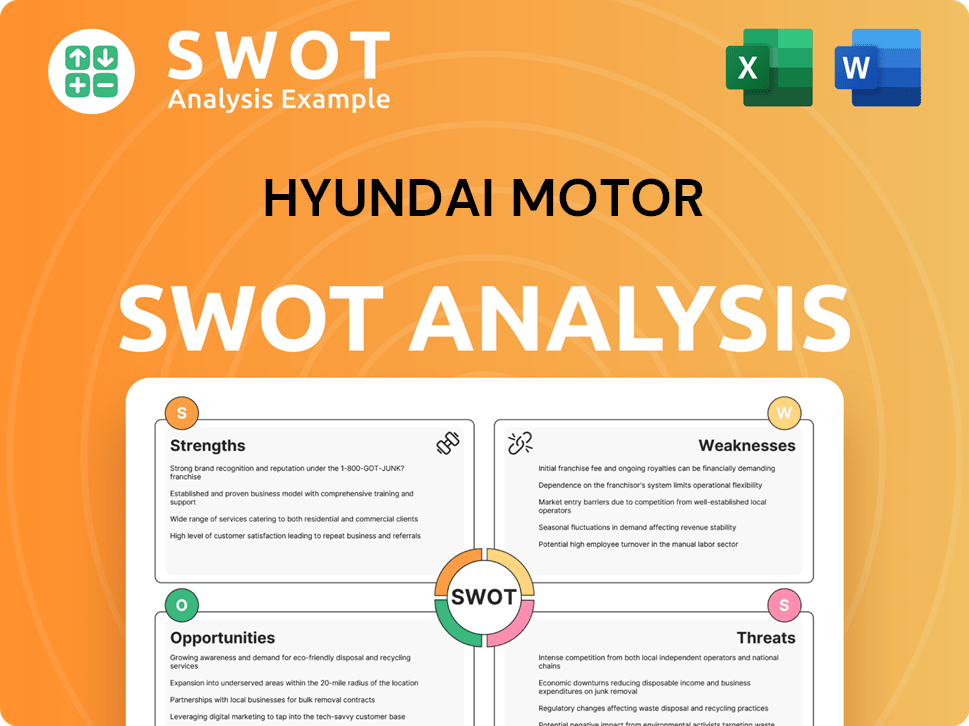
How Does Hyundai Motor Make Money?
The primary revenue streams for Hyundai Motor Company stem from its core business of selling vehicles globally. This includes a diverse range of products, such as passenger cars, SUVs, and commercial vehicles, which are sold across various international markets. In 2023, Hyundai Motor's financial performance demonstrated strong sales figures, reflecting its robust position in the automotive industry.
Beyond direct vehicle sales, Hyundai leverages additional revenue streams, including after-sales services and financial services. After-sales services encompass vehicle maintenance, parts sales, and warranty services, contributing to customer retention and recurring revenue. Financial services, provided through Hyundai Capital, support vehicle sales by offering financing and leasing options, thereby generating interest income.
Hyundai's monetization strategies involve a multi-faceted approach to maximize revenue. This includes tiered pricing for different vehicle trims and optional features, allowing customers to customize their purchases. Bundled services, such as extended warranties, provide additional revenue and foster customer loyalty. The company's investment in electric vehicles and hydrogen fuel cell technology positions it to capitalize on evolving market demands and potential new revenue streams.
Hyundai Motor Company's revenue model is primarily driven by vehicle sales, supplemented by after-sales services and financial products. The company employs various strategies to boost revenue and maintain a competitive edge. These strategies include product customization, bundled services, and a focus on future mobility solutions.
- Vehicle Sales: The cornerstone of Hyundai's revenue, encompassing a wide range of passenger cars, SUVs, and commercial vehicles sold globally. In 2023, Hyundai Motor reported a total revenue of 162.66 trillion South Korean Won (approximately 120.3 billion USD), demonstrating strong sales performance.
- After-Sales Services: These services include vehicle maintenance, parts sales, and warranty services, contributing to recurring revenue and customer retention.
- Financial Services: Through Hyundai Capital, the company provides financing and leasing options, facilitating vehicle sales and generating interest income.
- Tiered Pricing and Customization: Offering different trims and optional features allows customers to personalize their purchases, increasing the average transaction value.
- Bundled Services: Extended warranties and service packages generate additional revenue and enhance customer loyalty.
- Future Mobility: Hyundai is investing in electric vehicles and hydrogen fuel cell technology to capitalize on evolving market demands and explore new revenue streams.
Hyundai Motor PESTLE Analysis
- Covers All 6 PESTLE Categories
- No Research Needed – Save Hours of Work
- Built by Experts, Trusted by Consultants
- Instant Download, Ready to Use
- 100% Editable, Fully Customizable
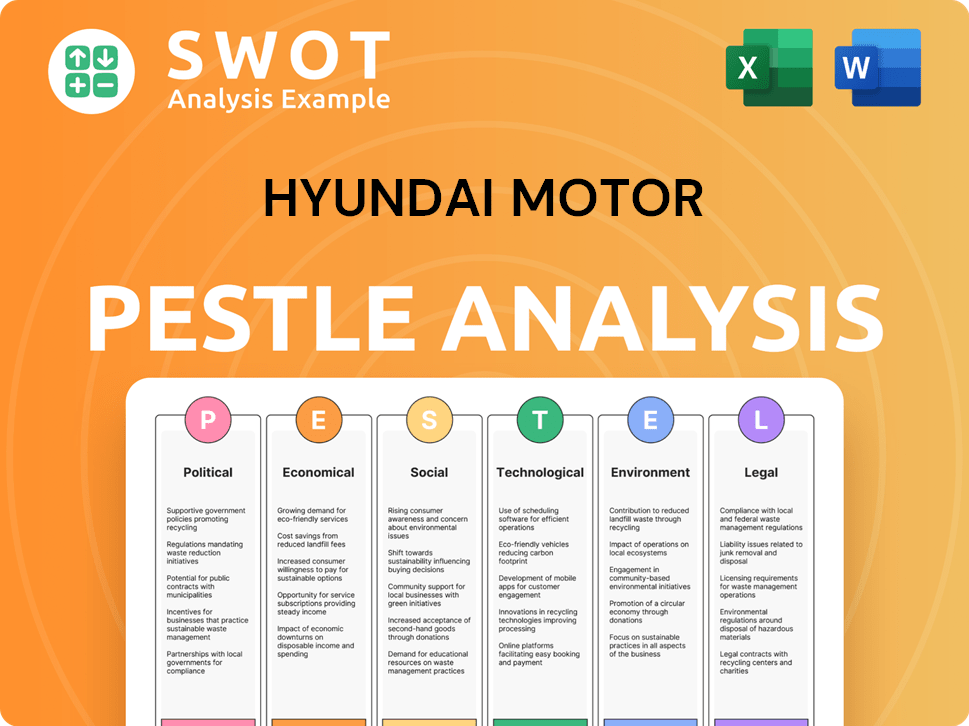
Which Strategic Decisions Have Shaped Hyundai Motor’s Business Model?
The evolution of Hyundai Motor Company has been marked by strategic shifts and key milestones that have shaped its Hyundai operations and financial trajectory. Early on, the company focused on expanding its global footprint, establishing manufacturing plants and sales networks worldwide. This aggressive internationalization was crucial in increasing its market share and brand recognition on a global scale. A significant move was the introduction of the Genesis luxury brand in 2015, which allowed Hyundai to compete in the premium segment, enhancing its brand image and diversifying its product offerings.
More recently, Hyundai's significant investments in electric vehicle (EV) technology represent a pivotal strategic direction. The development of the E-GMP platform and the Ioniq series demonstrates Hyundai's commitment to the shift towards sustainable mobility. This focus on EVs positions Hyundai as a key player in the rapidly growing EV market, aligning with global trends and regulatory demands for reduced emissions. The company's ability to adapt to these changes is fundamental to its long-term success.
Hyundai's journey has not been without challenges. Supply chain disruptions, particularly the global semiconductor shortage, impacted production volumes across the automotive industry in recent years. In response, Hyundai has focused on strengthening its supply chain resilience and optimizing production schedules to mitigate these effects. Furthermore, stringent emissions standards have driven substantial R&D investments in eco-friendly powertrains and technologies, ensuring the company remains compliant and competitive.
Key milestones include the aggressive expansion into global markets, the launch of the Genesis luxury brand, and substantial investments in electric vehicle technology. These strategic moves have been instrumental in shaping Hyundai's market position and brand perception. These moves have allowed the company to compete more effectively in diverse markets.
Strategic moves include the establishment of global manufacturing plants, the introduction of the Genesis brand, and a major focus on EV technology. These moves have enhanced Hyundai's market presence, diversified its product portfolio, and positioned it at the forefront of the electric vehicle revolution. The company's ability to adapt to changing market dynamics is a key strength.
Hyundai's competitive advantages include brand strength, technological leadership in EV battery technology, and economies of scale. The company's vertically integrated structure and focus on R&D in future mobility further enhance its competitive position. These factors enable Hyundai to maintain a strong presence in the global automotive market.
Recent developments include strategic partnerships for autonomous driving, and a focus on software-defined vehicles. These initiatives aim to enhance user experience and create new service opportunities. Hyundai continues to adapt to new trends and competitive threats by prioritizing R&D in future mobility.
Hyundai's competitive edge stems from its brand reputation, technological advancements, and cost efficiencies. Its brand strength, built on reliability and value, is a key asset. Technological leadership, particularly in EV battery technology, provides a distinct advantage. Economies of scale, derived from its massive production capabilities, allow for cost efficiencies. For more insights, explore the Marketing Strategy of Hyundai Motor.
- Brand Strength: Reputation for reliability, value, and design.
- Technological Leadership: Especially in EV and hydrogen fuel cell development.
- Economies of Scale: Derived from large production and global sales.
- Vertical Integration: Including steel production, enhancing cost control.
Hyundai Motor Business Model Canvas
- Complete 9-Block Business Model Canvas
- Effortlessly Communicate Your Business Strategy
- Investor-Ready BMC Format
- 100% Editable and Customizable
- Clear and Structured Layout
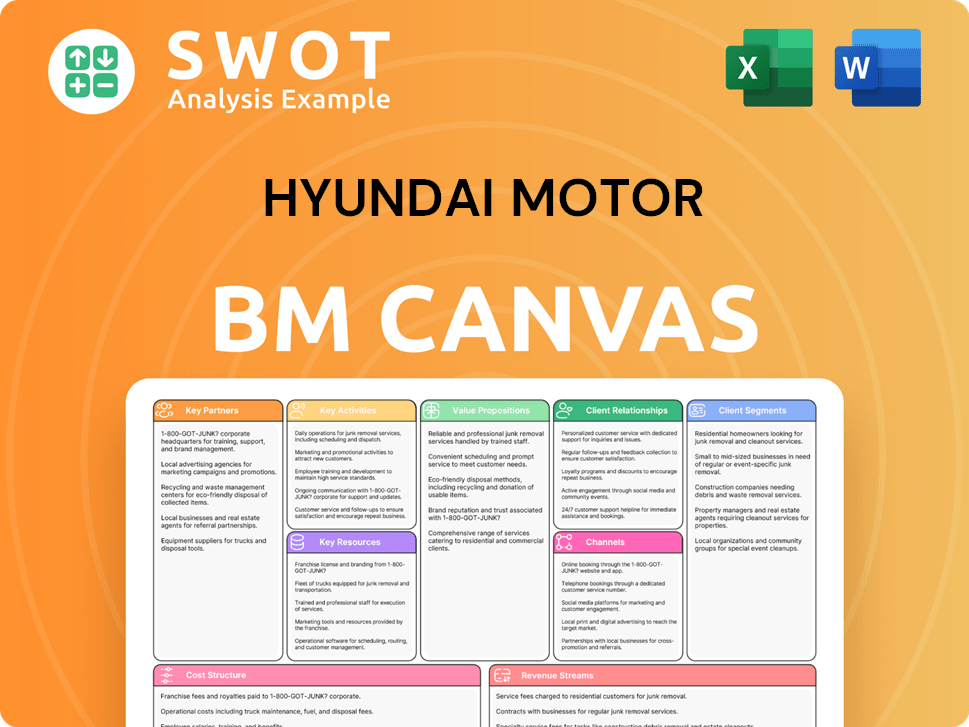
How Is Hyundai Motor Positioning Itself for Continued Success?
Hyundai Motor Company holds a strong position in the global automotive industry. The company's success is built on its ability to produce a diverse range of vehicles and its expanding global presence. In 2023, Hyundai Motor Group, including Kia, ranked third worldwide in sales with 7.32 million units sold, trailing only Toyota and Volkswagen.
However, Hyundai operations face several challenges. The automotive industry is highly competitive and subject to rapid changes. Technological advancements, economic fluctuations, and shifting consumer preferences all contribute to the dynamic nature of the industry, influencing Hyundai's business model.
Hyundai Motor Company is a leading global automaker, consistently ranking among the top manufacturers worldwide. It has a significant market share in key regions like South Korea, North America, Europe, and India. The company has built strong customer loyalty through its diverse product offerings and improving brand perception.
Hyundai faces risks from regulatory changes, particularly in emissions and safety standards. Intense competition, especially in the EV segment, poses a threat. Technological disruptions like autonomous driving and connected car services require substantial investment. Changing consumer preferences and geopolitical instability also present significant challenges.
Hyundai's future involves a strategic shift towards sustainable mobility and technological innovation. The company plans to accelerate its transition to electric vehicles, investing in hydrogen fuel cell technology and autonomous driving. The goal is to become a smart mobility solutions provider, expanding beyond vehicle manufacturing.
Hyundai is focused on expanding its EV offerings and investing in hydrogen fuel cell technology. The company is also working on autonomous driving capabilities and advanced connectivity features. Leadership aims to transform Hyundai into a comprehensive mobility services provider, leveraging its brand and diversifying revenue streams.
Hyundai aims to achieve full electrification in Europe by 2035 and targets 2 million EV sales annually by 2030. This aggressive growth strategy demonstrates Hyundai's commitment to leading the EV market. The company is focused on leveraging its strong brand and investing in cutting-edge technologies to diversify its product portfolio.
- Hyundai is expanding its EV lineup with new models across its brands.
- The company is investing heavily in hydrogen fuel cell technology.
- Hyundai is working on autonomous driving and advanced connectivity features.
- It plans to explore new revenue streams from mobility services and software.
For a more detailed look at Hyundai's customer base, consider reading about the Target Market of Hyundai Motor.
Hyundai Motor Porter's Five Forces Analysis
- Covers All 5 Competitive Forces in Detail
- Structured for Consultants, Students, and Founders
- 100% Editable in Microsoft Word & Excel
- Instant Digital Download – Use Immediately
- Compatible with Mac & PC – Fully Unlocked
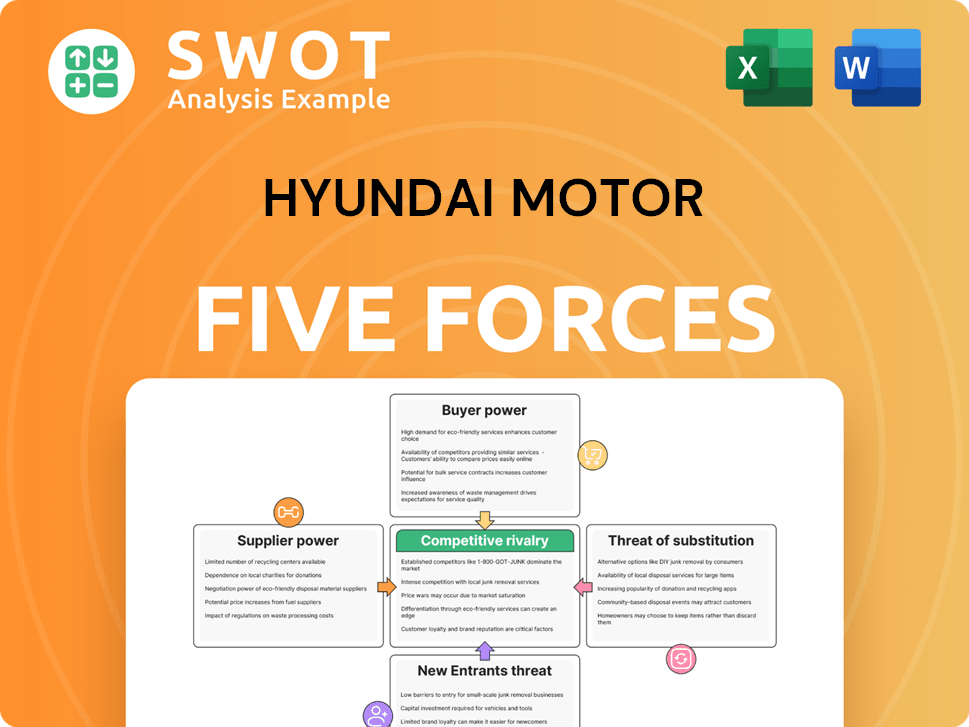
Related Blogs
- What are Mission Vision & Core Values of Hyundai Motor Company?
- What is Competitive Landscape of Hyundai Motor Company?
- What is Growth Strategy and Future Prospects of Hyundai Motor Company?
- What is Sales and Marketing Strategy of Hyundai Motor Company?
- What is Brief History of Hyundai Motor Company?
- Who Owns Hyundai Motor Company?
- What is Customer Demographics and Target Market of Hyundai Motor Company?
Disclaimer
All information, articles, and product details provided on this website are for general informational and educational purposes only. We do not claim any ownership over, nor do we intend to infringe upon, any trademarks, copyrights, logos, brand names, or other intellectual property mentioned or depicted on this site. Such intellectual property remains the property of its respective owners, and any references here are made solely for identification or informational purposes, without implying any affiliation, endorsement, or partnership.
We make no representations or warranties, express or implied, regarding the accuracy, completeness, or suitability of any content or products presented. Nothing on this website should be construed as legal, tax, investment, financial, medical, or other professional advice. In addition, no part of this site—including articles or product references—constitutes a solicitation, recommendation, endorsement, advertisement, or offer to buy or sell any securities, franchises, or other financial instruments, particularly in jurisdictions where such activity would be unlawful.
All content is of a general nature and may not address the specific circumstances of any individual or entity. It is not a substitute for professional advice or services. Any actions you take based on the information provided here are strictly at your own risk. You accept full responsibility for any decisions or outcomes arising from your use of this website and agree to release us from any liability in connection with your use of, or reliance upon, the content or products found herein.